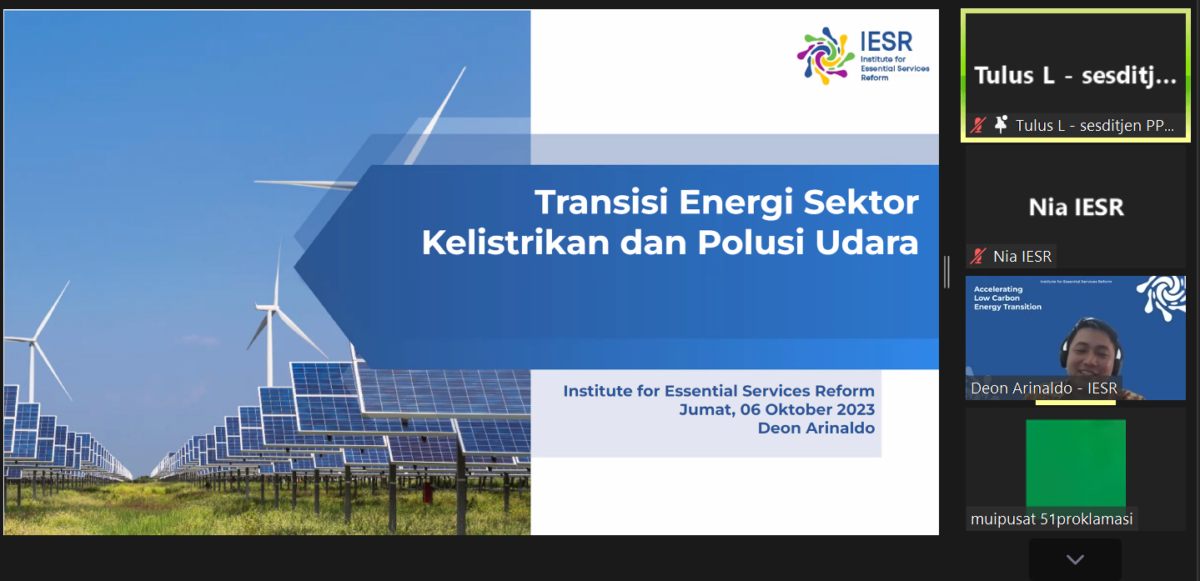Jakarta, October 6, 2023 – Air pollution has been a significant issue faced by the residents of Jakarta, Bogor, Depok, Tangerang, and Banten (collectively known as Jabodetabek) for quite some time now. These unfavorable circumstances require urgent attention and action because environmental pollution in Jakarta can portray Indonesia’s development as harming the environment. Program Manager of Energy Transformation, Institute for Essential Services Reform (IESR), Deon Arinaldo, mentioned that air pollution impacts human health, causing respiratory diseases, reproductive disorders, cancer, and premature death. According to Deon, who cited data from Our World in Data, fossil energy, particularly coal, is the largest source of air pollution and can lead to premature death. This is indicated by the number of deaths per unit of electricity generated. These deaths include those caused by air pollution and the likelihood of accidents occurring in the supply chain.
“Oil, as well as coal, are not environmentally friendly energy sources. Biomass is a cleaner alternative but has negative impacts when burned, such as producing more particulate matter (PM). On the other hand, wind and solar energy have significantly lower chances of causing air pollution because they mostly rely on infrastructure development,” explained Deon at an Indonesian Ulema Council (MUI) event entitled “Energy Hijrah Movement and Air Pollution Control Discourse” on Friday (6/ 10/2023).
Deon stated that the energy system in Indonesia is still dominated by fossil energy. It is crucial to begin the energy transformation process systematically and as soon as possible in all sectors. According to data from the Ministry of Energy and Mineral Resources (ESDM), Indonesia has a potential of approximately 3,686 GW for renewable energy. By utilizing the abundance of renewable energy, it can be used as the primary source of capital for the energy transition. However, we have yet to optimize this potential fully.
“In the national electricity plan (RUKN), coal-fired power plant capacity will peak in 2030 and decrease according to the planned operating period (natural retirement). Presidential Decree 112/2022 regulates a moratorium on new CFPPs, with exceptions for those already in the pipeline or related to PSN/downstream. Additionally, new CFPPs have a limited operating life until 2050.” said Deon.
Deon highlighted various strategies to mitigate air pollution generated by CFPPs. These strategies include implementing energy-efficient and energy-saving practices, halting the construction of CFPPs and replacing them with clean energy sources, speeding up the closure of existing CFPPs, and enforcing stricter standards for CFPP emissions. Additionally, installing air pollution control devices and monitoring the pollution levels would also help reduce air pollution.
Secretary of the Directorate General of Environmental Pollution and Damage Control (PPKL) KLHK, Tulus Laksono, said that a task force is currently performing strict supervision in various sectors, including industries, which are known to be a significant source of pollution. This task force’s primary responsibility is to identify pollution sources and conduct direct monitoring in the field, provide regional supervision, and ensure coordination. Tulus further added that currently, seven industries are under supervision, 34 are facing administrative sanctions, and eight are being subject to sanctions in Jakarta.
“A major cause of air pollution in Jabodetabek is motor vehicle exhaust, which accounts for 44% of the pollution, followed by coal-fired power plants (CFPPs) at 34%, and the remaining pollution comes from the industrial sector. The Ministry of Environment and Forestry has opened an emissions testing service for motor vehicle owners since August 17, 2023, to address this issue. The emissions testing service aims to monitor and control exhaust emissions. On average, around 100-150 motorized vehicles undergo emissions tests at the KLHK office daily, but unfortunately, around 20% per day do not pass the emissions test,” explained Tulus.
Apart from that, Tulus explained, the task force also monitored open burning in 57 locations spread across Jakarta, Depok, South Tangerang, Tangerang Regency, as well as Bogor Regency and City. The activities include burning rubbish, gardens, cables, and charcoal. Prior to the action, monitoring was carried out through 15 air quality monitoring stations spread across the Jabodetabek area. The Ministry of Environment and Forestry has urged several companies to transition from fossil fuels to renewable energy sources to combat air pollution, as per Tulus. Companies like Pertamina Geothermal Energy and Star Energy will work on developing geothermal energy with a capacity of 5,553 GW. In comparison, PLN Nusantara will focus on wind energy with a capacity of 600 GW. Additionally, PT Bukit Asam and PLN Nusantara will work together towards a capacity of 4,930 GW.
“There are still several industries in Jakarta that use coal for their boilers, resulting in approximately 15,741 tons of coal burned each month. However, efforts are being made to encourage an energy transition towards cleaner sources. The DKI Transportation Agency has been working with these industries to promote this transition, and small businesses that still use firewood or coal will be urged to switch to cleaner energy alternatives,” explained Tulus.

